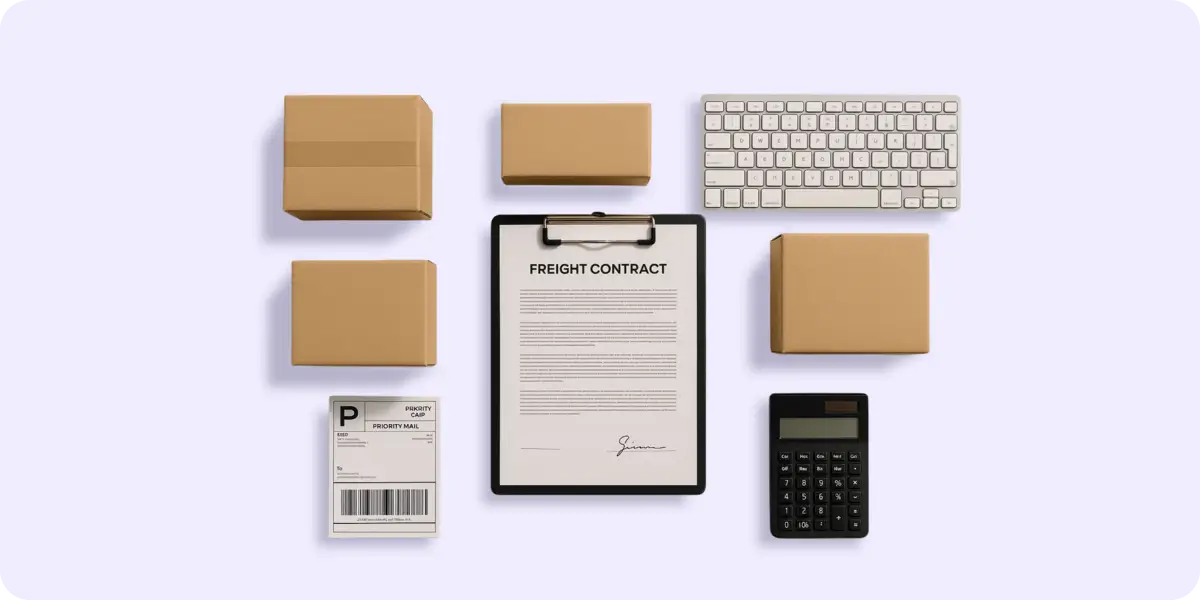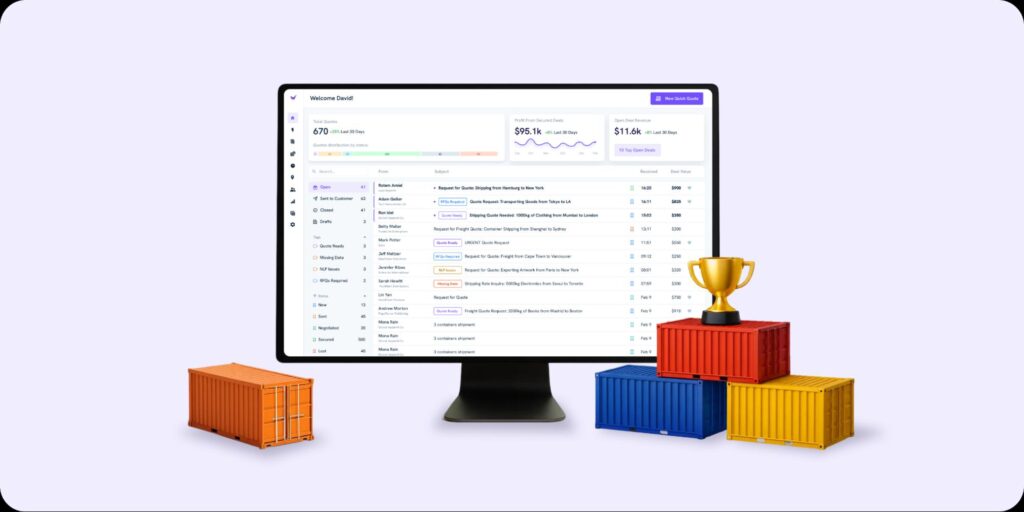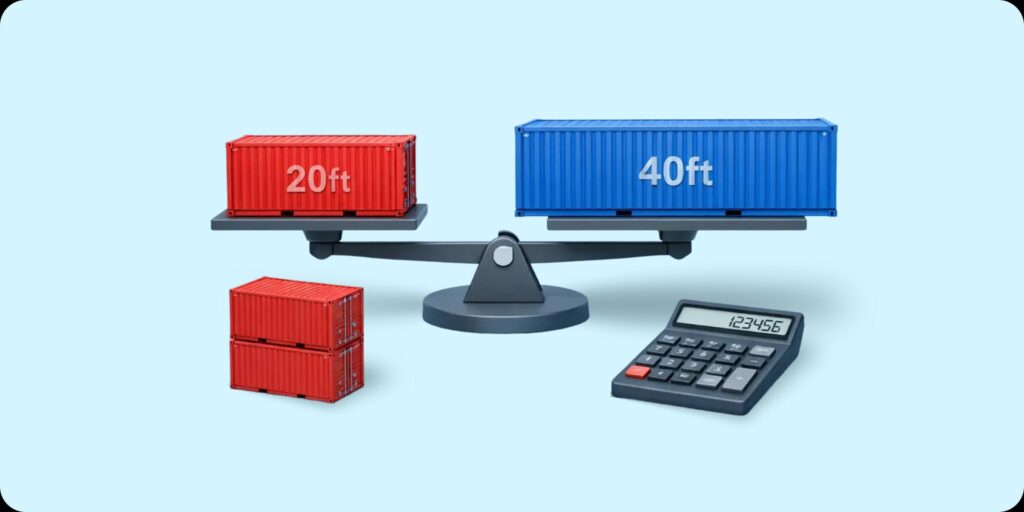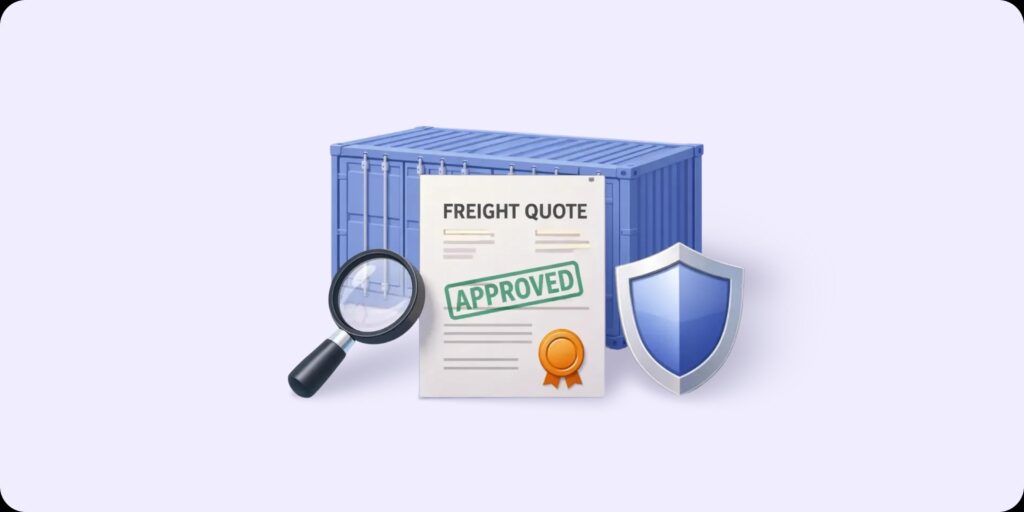Key Takeaways
- Centralized freight contract management eliminates data silos, improves version control, and enhances compliance visibility across carriers, regions, and services.
- Automating workflows like load tenders and BOL generation reduces manual input, speeds up operations, and cuts costs.
- Real-time tracking and analytics help forwarders align contracts with market shifts, optimize rates, and monitor carrier performance.
- Common challenges, like freight rate volatility and compliance complexity, are best addressed through automation, centralized data, and flexible contracts.
- Wisor boosts margins and efficiency by automating rate management, enabling real-time contract visibility, and integrating predictive pricing, quote generation, and compliance tracking into one intelligent platform.
Understanding Today’s Freight Contract Market
Today’s logistics industry is more complex than ever. Freight forwarders maintain dozens to thousands of agreements across carriers, services, and regulatory environments. While the sheer volume of transportation contracts is overwhelming, the rapid shifts in regulatory compliance and the evolving nature of the shipping industry, which can render terms unfavorable overnight, are also major challenges.
In this environment, individually negotiating and manually handling contracts is a thing of the past. Instead, freight forwarders must leverage supply chain networks and partnerships, focus on flexibility over high-volume discounts, and use freight forwarding technologies to manage those contracts. In the 2024 Third-Party Logistics Study, 87% of shippers agreed that adopting technology such as data dashboards and centralization was key to success.
Types of Freight Contracts
Freight contracts come in many forms, each designed to support different stages of the shipping lifecycle and modes of transport. From broker-carrier agreements to multimodal documents, these contracts define responsibilities, pricing, service terms, and liability management. Understanding the distinct types helps freight forwarders ensure legal clarity, operational precision, and compliance at every turn.
- Broker Carrier Agreements: Broker carrier agreements seal rates, payment terms, insurance requirements, delivery, and other details with the carrier.
- Load Tenders: Load tenders are your shipment plan, detailing what’s being shipped, where, and who’s receiving it.
- Warehouse Receipts (WR): Warehouse receipts prove ownership of goods in a warehouse and are crucial for insurance, reclaiming goods, or even using goods as collateral.
- Rate Confirmations: Rate confirmations lock in the agreed-upon rate.
- Charter Party Agreements (CPA): CPAs outline the terms for chartering a vessel, from single trips to long-term engagements.
- Accessorial Contracts: These logistics contracts outline potential extra fees like fuel, detention time, etc., so you can preemptively set terms on unexpected costs.
- Bills of Lading (BOL): A bill of lading is a receipt for the goods you’re shipping.
- Air Waybills (AWB): These are the air freight version of a bill of lading.
- Multimodal Transport Documents (MTD): These documents cover the entire journey as you move from train to sea to air or any other type of transport.
Key Components of Freight Contract Management
Effective freight contract management isn’t just about storing agreements; it’s about embedding structure, visibility, and control into how those contracts are executed. This section explores the foundational components of a strong contract management system, and together, these elements ensure your contracts drive value.
Centralize Freight Contract Management
Creating a single source of truth standardizes logistics contracts and streamlines operations. By unifying contract data across carriers, services, and geographies, forwarders eliminate silos, reduce error-prone handoffs, and unlock real-time updates, version control, and audit trails in one place.
Operational Integration
Carrier contracts integrate with workflows and business processes across the supply chain. Implement a freight contract management tool that integrates with these workflows—for example, by enabling automatic generation and dispatch of load tenders and bills of lading (BOLs), without manual input. Having these workflows saves time and money.
Establish Frameworks for Tracking and Updating Logistics Contracts
The logistics industry fluctuates constantly. It’s critical that you have real-time tracking in place. This includes monitoring rates, ensuring compliance, managing coverage areas, tracking volume agreements, and assessing utilization.
The best carrier contracts have flexibility built in, so you can scale up and down and make rapid changes, without adding extra costs. Your freight contract management helps you negotiate those details.
Continuous Improvement and Analytics
Utilization, overflow, service levels, and coverage are fundamental aspects of freight forwarding, but you need to track and automate them. It’s critical to monitor real-time performance and usage, and directly link that data to your logistics contracts, ensuring that contract decisions reflect current market conditions and actual operational behavior.
Workflow and Process Automation
Automation plays a critical role in managing contracts efficiently across the supply chain. In the context of freight contracts, this includes streamlining procurement workflows, automating documentation related to inventory and warehousing, and enhancing material handling processes. Increased automation drives time savings, minimizes bottlenecks, and improves both consistency and compliance.
Key Automation Areas:
- Document Processing: Automates generation and handling of bills of lading (BOLs), rate confirmations, invoices, and delivery receipts.
- Decision Support: Assists with shipment validation, auto-filling of contact details, risk assessments, inconsistency flagging, and trend identification.
- Data Validation: Ensures the accuracy of carrier updates, delivery instructions, load notes, and accessorial charges.
- Data Updates: Maintains current data across TMS logs and forwards updates to relevant stakeholders with accuracy checks.
Compliance Considerations in Freight Contract Management
Failing to meet compliance can result in delays, fines, and legal action. It is important to align freight contracts with international trade regulations, environmental standards, and safety standards in each jurisdiction through which you’re moving goods.
- International Trade Regulations: Contracts must stipulate standards for customs, duties, import/export controls, trade sanctions and embargoes, rules like Incoterms, and product safety standards and regulations per region.
- Environmental Regulations: Every regional logistics industry has its own environmental regulations from packaging standards to emissions restrictions, such as MARPOL, the ETS & ETS2, and CSDDD. Aligning carrier selection with these requirements ensures regulatory compliance.
- Safety and Security Standards: Most regions have their own safety and security standards, ranging from CTPAT and AEO to the Container Security Initiative, and your carriers have to meet those local regulations.
Benefits of Effective Freight Contract Management
When managed strategically, freight contracts become a powerful lever for cost savings, efficiency, and risk reduction. Here are some core benefits forwarders unlock when freight contracts are treated as a dynamic asset, and not a static document:
- Cost Optimization: Improving margin is critical, with studies by McKinsey showing gross profit margins are at a 10-year low. Managing contracts allows freight forwarders to reduce costs by flagging redundant services and overlapping coverage, mapping rates to real-time market conditions, tracking volume commitment, and even improving routing and mode selection.
- Operational Efficiency: Freight contract management delivers visibility and control across the fulfillment process, with alerts, data accessibility, and compliance all in one place. This enables improvements in carrier utilization, route planning, and overall shipping strategy, allowing you to respond faster and more effectively to shifting market demands and external disruptions.
- Enhanced Compliance: By centralizing freight contract management, you gain deeper insights into compliance across your logistics network. Automated compliance and regulatory tracking help flag non-compliant terms, manage liability, and identify carriers that meet specific compliance requirements.
- Improved Service Quality: Clear carrier contract visibility allows for better communication of pricing, terms, and delivery expectations. With freight contract management, you can monitor SLAs, assess carrier performance, and apply consistent strategies to address service gaps.
Good to Remember
Freight contract errors, especially in version control, can lead to overcharges or SLA breaches. Never rely on email threads or static PDFs as a source of truth.
Common Challenges in Freight Contract Management
Tracking content, amendments, and rate changes across potentially thousands of freight contracts presents significant challenges. Manual contract management creates bottlenecks, slowing down processes, limiting visibility, and hindering collaboration across teams and departments.
|
Challenge |
Problem |
Common Solutions |
| Version Control Issues | Tracking updates, which can happen overnight, and across multiple vendors, is often impossible. | Freight forwarders rely on software for real-time synchronization and updates, with a single source of truth for all documents. |
| Compliance Complexities | The global freight forwarding industry faces big changes to rules every year. You’ll also have to navigate regional regulatory standards. | Automatically tracking compliance requirements across shipments is critical to avoiding costly delays, fines, and legal trouble. |
| Freight Rate Volatility | Freight rates are dynamic with factors like fuel costs, demand/availability, and market fluctuations affecting the viability of your negotiated rates. | Maintaining flexible carrier contracts and leveraging rate tracking helps keep your margin high. |
| Data Silos | With most freight managers handling thousands of contracts, a lack of visibility can result in overlapping coverage and contract underutilization. | Creating a single source of truth with centralized databases makes data accessible so you can optimize coverage, utilization, and costs. |
| Manual Processes | Despite the complexity and volume of freight contracts, many forwarders manually process contracts. | Automating processes with AI can save hundreds of hours of manual labor. |
| Lack of Visibility | If you’re handling every contract separately, you can’t see how contractual obligations, shipping agreements, and opportunities line up. | Centralized contract repositories and dashboards are key to aligning services and costs across your supply chain. |
| Negotiation Bottlenecks | Bottlenecks at any stage of the approval or procurement process can delay contract finalization. | Automating operational processes speeds up documentation and approvals. |
Best Practices for Freight Contract Management
Optimizing contract management demands consistent practices that scale with your operations, and create the foundation for efficiency, resilience, and growth. Here’s how industry leaders are approaching freight contract management to stay competitive in a dynamic global market:
- Regular Contract Audits: Use audits to verify that carrier performance matches contractual obligations and expectations in terms of service, quality, and volume. Ensure that terms stay aligned with market conditions, business needs, and regulatory compliance.
- Leveraging Technology for Automation: Managing contracts is too much work to do manually. Use a centralized database to automatically track contracts, and leverage automation for regulatory compliance updates, price and rate tracking, route and regional capacity tracking, etc.
- Training and Development: Implement training programs to familiarize carriers with delivery expectations, compliance requirements, routing, and any special requirements you have.
- Establishing Clear Communication Channels: Regular touchpoints help you stay ahead of issues, align on service and schedules, and collaborate on improvements. Even if you have relationships with hundreds of carriers, staying in touch is critical.
Expert Tip: Turn Contracts Into Operational Levers, Not Admin Burdens
- Centralize before you automate: Before deploying any AI tools, ensure all freight contracts, from AWBs to CPAs, are housed in a centralized, searchable database. This enables dynamic rate matching, SLA monitoring, and real-time compliance tracking across your global shipments.
- Link contract data to quoting workflows: Integrate contract terms (rates, accessorials, volume tiers) directly into your quote generation logic. Use tools like Wisor to pull accurate rates in real time, cutting down quoting cycles and minimizing margin erosion from misapplied terms.
- Audit rate validity every 30–45 days: Build a recurring process to reconcile actualized shipment costs with contracted rates. Include a checkpoint for accessorial overages and missed volume thresholds to renegotiate before losses compound.
- Track amendments like load plans: Use version control protocols for rate changes, contract addendums, and service terms, with timestamped logs and auto-notifications to ensure ops, sales, and compliance teams are always working from the latest terms.

Insight by
Nimrod
VP R&D, Wisor
How Wisor Enhances Freight Contract Management with AI, Visibility, and Margin Control
Wisor delivers an intelligent, centralized platform that transforms freight contract management for freight forwarders and logistics providers. By combining automation, AI-powered insights, and seamless visibility, the platform enables stronger margins, smarter decisions, and greater operational efficiency.
- Centralized Contract Repository: Wisor consolidates all contracts into a single, searchable dashboard, providing full visibility over carriers, service levels, rates, and coverage. This centralization streamlines access and oversight, enabling faster decision-making and stronger compliance control.
- Automated Rate Management: Rates are continuously monitored and matched to shipments in real-time, ensuring that freight is always assigned at the most cost-effective contracted rate. Dynamic rate alignment with market trends helps reduce overpayment and maintain competitive pricing.
- Predictive Pricing Models: AI models analyze historical and real-time data to forecast pricing trends and rate movements. This allows teams to negotiate contracts with better timing and intelligence, leading to more favorable long-term rate agreements.
- Instant Quote Generation: Wisor automates quote creation by pulling rates from contracts and aligning them with customer shipment details. This results in faster turnaround on quotes with improved accuracy, enhancing customer experience and increasing conversion rates.
- Seamless System Integration: The platform integrates with leading TMS and ERP systems and connects with real-time data feeds from road, air, and ocean carriers. These integrations eliminate silos, synchronize data, and ensure a cohesive view across all logistics systems.
- Real-Time Analytics and Visibility: Contract performance metrics are tracked live, including service levels, delivery timelines, and cost-to-serve. This visibility replaces static spreadsheets and enables proactive management based on real-world data.
- Carbon Impact Insights for Contracts: Wisor calculates emissions data across carriers and routes, allowing users to evaluate environmental impact during carrier selection and routing. These insights support sustainability goals and compliance mandates without compromising efficiency.
- Collaborative Workflows for Global Teams: Teams can co-edit contracts, manage version history, and contribute to shared workflows across geographies. A single source of truth ensures clarity, accountability, and seamless collaboration across departments.
- Historical Win/Loss Analysis: Past quoting data is analyzed to reveal patterns in bid success, rate competitiveness, and carrier performance. AI uses this intelligence to improve future quoting strategies and drive higher win rates.
- Margin Optimization: AI algorithms identify the most profitable quoting opportunities by analyzing cost structures, carrier terms, and market trends. This empowers teams to prioritize high-margin deals and strengthen overall contract performance.
- Smart Alerting & Compliance Tracking: Automated alerts notify teams of SLA violations, expiring contracts, rate threshold breaches, and compliance risks. These alerts enable faster response times and ensure contractual obligations are consistently met.
- AI-Driven Process Automation: Wisor applies AI to automate repetitive tasks such as data entry, validation, and rate lookups. This reduces manual workload and accelerates contract workflows, freeing teams to focus on strategic execution.
Conclusion
Modern freight contract management delivers far more than just administrative value. When executed effectively, it reduces inefficiencies, eliminates redundancies, and enhances both profitability and operational agility. Areas such as rate alignment, carrier utilization, and SLA compliance become strategic levers for performance.
Centralized repositories, AI-enabled automation, and real-time data are essential to elevating contract operations. With the right systems in place, freight contracts transform from static documents into dynamic tools for competitive advantage and cost efficiency.
Explore how Wisor can automate and centralize contract management across your full supply chain. Book a demo today.







